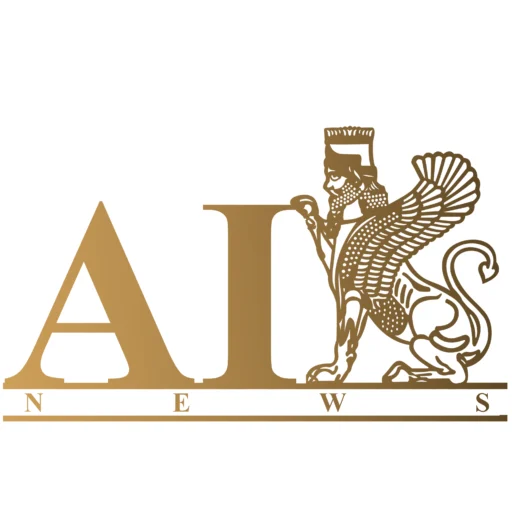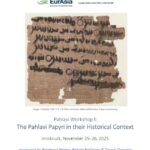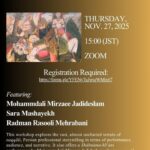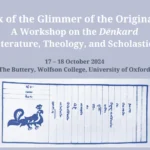“What is Zoroastrianism?” Workshop Series
- Meysam Saebi
- Workshops
- 2025/05/15

In a series of six workshops from 25 May to 30 November 2025, thanks to the World Zoroastrian Organisation, Dr Mehrbod Khanizadeh (SOAS, University of London) will explore the history of Zoroastrianism from its roots in the second millennium BCE through to the present day. He will discuss religious, historical, as well as social aspects of the religion’s development. These workshops are available both on-site in Fredie Mercury 1, Feltham, London TW13 5DF and online via Zoom.
Dr. Mehrbod Khanizadeh currently teaches courses on Avestan, Middle Persian (Pahlavi), and Zoroastrianism at SOAS, University of London. He specialises in Zoroastrianism and ancient Iranian languages. His recent peer-reviewed publications include an article on the genealogy of the Iranian bilingual Avestan Pahlavi Yasna manuscripts, published in the Bulletin of SOAS in 2021, and a study of the etymology of the Avestan personal name pourušaspa- published in the Journal of Iran and the Caucasus in 2024. His edition of the Avestan text of chapters 9-11 of the Yasna will be published as a monograph in 2025.
Please contact shahin.bekhradnia@w-z-o.org for more information and booking your place. The sessions are free, but you need to register for both online and on-site attendances. See dates and timings below for each of the workshops.
Workshop 1 (Sunday 25 May, 2025, 15:00 – 17:00 UK time)
This first session, which explores the roots of Zoroastrianism, begins with a discussion of the social, geographical, and cultural contexts in which the religion emerged. Then, it offers a brief introduction to the Avestan language, in which the earliest Zoroastrian texts were composed. Finally, considering local dialects found within the Avestan texts, Workshop 1 will investigate the early transmission of the Avesta.
Workshop 2 (Sunday 29 June, 2025, 15:00 – 17:00 UK time)
The Gāthās of Zarathushtra have long been considered the central texts of Zoroastrianism. Employing examples from antiquity up to the present day, Workshop 2 will discuss the historical significance of the Gāthās. Furthermore, the philosophical ideas contained in the Gāthās will be studied.
Workshop 3 (Sunday 13 July, 2025, 15:00 – 17:00 UK time)
In Workshop 3, the history and features of Zoroastrianism under the Achaemenid, Parthian, and Sasanian dynasties will be reviewed.
Workshop 4 (Sunday 28 September, 2025, 12:00 – 14:00 UK time)
Workshop 4 will examine the history of Zoroastrianism from the Muslim-Arab conquest of Persia in the 7th century until the 11th century. In this session, topics on conversion, post-Islamic Zoroastrian literary productions and Zoroastrian priesthood in the early Islamic period will be discussed.
Workshop 5 (Sunday 26 October, 2025, 15:00 – 17:00 UK time)
Based on the Zoroastrian tradition, a group of Zoroastrians, known today as the Parsees, fled their homeland following the Islamisation of Iran and sought refuge in India. Workshop 5 will study the earliest available evidence regarding the presence of the Parsees in India. This session will also discuss the relations between Iranian Zoroastrians and their Indian co-religionists from the 14th to the 18th centuries.
Workshop 6 (Sunday 30 November, 2025, 15:00 – 17:00 UK time)
Workshop 6 will analyse the history of Zoroastrianism from the 19th century to the present day. It will also analyse the impact of modernity on Zoroastrianism and examine changes in Zoroastrian traditions during the modern period.





